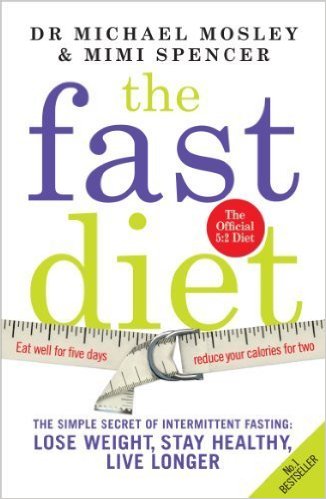
What is the 5:2 Diet?
Technically, this could be in the review section. However, it deals with fat loss, so it seems more appropriate here. The problem with a lot of these diets plans, is that there is mostly anecdotal evidence of their effectiveness. For every individual who says it worked, there is another who said it didn’t. Who is to say there weren’t other factors that led to success or failure of said diet plan. Despite this I will do my best to give both the pros and cons of the 5:2 diet, as well as much science as I can (…if there is any), to substantiate any claims. Fine then, just what is the 5:2 diet?
Overview So, just what is the 5:2 diet? Well first things first…The originator of the 5:2 diet is Dr. Michael Mosley, who revealed the plan in his book: “The Fast Diet: The Secret of Intermittent Fasting – Lose Weight, Stay Healthy, Live Longer.” Quite simply, on the 5:2 diet, you fast for 2 days out of the week and eat normally on the other 5 days. On “fast” days you can eat up to 500-600 calories with no restriction on when these calories are consumed. So, you can have 500-600 calories in one meal or you can spread it out throughout the day. On the other 5 days or “feast” days you can eat more generously without paying too much attention to caloric intake . This does not mean that you should binge and go crazy (keep to 2000/2500 calories for women/men). Of course, the healthier the “feast” days, the better off you will be.
5:2 diet, you fast for 2 days out of the week and eat normally on the other 5 days. On “fast” days you can eat up to 500-600 calories with no restriction on when these calories are consumed. So, you can have 500-600 calories in one meal or you can spread it out throughout the day. On the other 5 days or “feast” days you can eat more generously without paying too much attention to caloric intake . This does not mean that you should binge and go crazy (keep to 2000/2500 calories for women/men). Of course, the healthier the “feast” days, the better off you will be.
Claims The benefits of intermittent fasting are that during the fast period the body goes into repair mode. During this time it uses fats as the primary source of fuel and metabolism actually goes up and not down as commonly believed. Cardiovascular and cognitive benefits are suggested outcomes of intermittent fasting.
Studies and Pros We’ve been led to believe that starvation causes the body to go into preservation mode and metabolism slows down. However, we have to define what starvation is. There are studies that show short term starvation (48 hr, 84 hr) actually increases metabolism during the first 36-48 hrs. After a prolonged period of fasting, metabolic rate does go down, in order to preserve us, until the next meal. So there does seem to be advantages of a short intermittent fast. There is some animal research that shows this type of fasting also lowers cholesterol and triacylglycerol concentrations, heart rate and blood pressure and improves cardiac response to myocardial infarction. In limited human trials, the benefits were, higher HDL cholesterol (The good kind) and lower triacylglycerol concentrations. Studies also show that intermittent fasting (24 hrs without food) and 40% caloric restriction both offered protection against Alzheimer’s disease. Another study links starvation response in mice to prolonged life expectancy.
Cons Well, many “experts” claim that fasting causes a metabolic slow down. As was discussed before, this does not occur in the first 36-48 hrs. Loss of muscle does not occur during this time either. There are no studies that I’ve found (Believe me, I looked), that show metabolism decreases or muscle loss takes place in this time period. Beyond a certain period of time it does occur. Show me a scientific study that says short-term fasting has a negative impact on metabolism and muscle maintenance and then I’ll look into it and might believe it.
The other criticism is that people will tend to pig out on the remaining 5 days due to cravings they feel on their “fast” days. During the fast period, you tend to think about food even more than usual, which could  lead to binging. This is a valid point. It really depends on the individual and how much self-control you have. No one says it will be easy to begin with. Some people however, have reported that it gets easier as you go along. It is recommended that you eat proteins and vegetables to feel full without adding extra calories. Also it might be better to spread out the 500-600 calories through the day.
lead to binging. This is a valid point. It really depends on the individual and how much self-control you have. No one says it will be easy to begin with. Some people however, have reported that it gets easier as you go along. It is recommended that you eat proteins and vegetables to feel full without adding extra calories. Also it might be better to spread out the 500-600 calories through the day.
Now this type of fasting is definitely not recommended for pregnant women, kids, people with diabetes and other existing medical conditions or eating disorders. Use some common sense. If there is any doubt, about if it is safe for you, talk to your doctor first.
Summary This 5:2 diet is relatively new with few studies done on it. So far it seems positive but more research and human trials need to be conducted to determine the long term effects of this diet. There is no equipment to buy. It is simple to follow and unless you’re pregnant, a kid, diabetic or have an eating disorder, it should be safe. There is no rule that says you have to follow this diet. If you don’t like it and prefer another diet, that works for you, then by all means do that. If you choose to, you can find more information in the book The Fast Diet: The Secret of Intermittent Fasting – Lose Weight, Stay Healthy, Live Longer . Don’t forget to like and share…hey, sharing is a virtue…
P.S. The Healthy Goat has not eaten for 3 whole days, as he fell asleep during his initial fast day. He was awakened by the salesgirl at “Beds ‘r’ us” after they heard loud snoring coming from the showroom. The Skinny Goat was last seen at “Mama Mia’s Pizza Eateria”(yes, the same one he was kicked out off in the “fats will make you fat” post)…No judgement here…it was his cheat day anyway.

Thanks for the information on the 5 – 2 diet. I had always been under the impression that starving sends the body into preservation mode and slows down metabolism. The notion that in the short term it actually speeds up the metabolism is very interesting and as you have indicated is supported by some studies. I’ll be looking more into this…that said I am not sure I could manage fasting (consuming 500 calories) for 1 or 2 days each week.
Hi Marc,
Starvation sends the body into preservation mode by slowing metabolism after approx 48 hrs. It might be hard at first to survive on 500 calories. But like with everything else start slowly. Gradually work your way down to 500.
Cheers
This looks interesting. Although quite difficult definitely worthwhile experiencing. I suppose one has to find the best fit for oneself, and not every diet will suit every person.
I wondered, can you fast for any two days of the week, or must it be two days one after the other?
Have you tried this diet and has it worked for you?
Hi Michel,
It is recommended that the fast days are non-consecutive. So, you could do it with 5 days in between. I do weight training and other sports 6 days for the week. So I do a modified version of it and fast for 1 day. It has been enough for me to see results.
I don’t feel tired and I’m always very alert and it does help with the stubborn extra pounds.